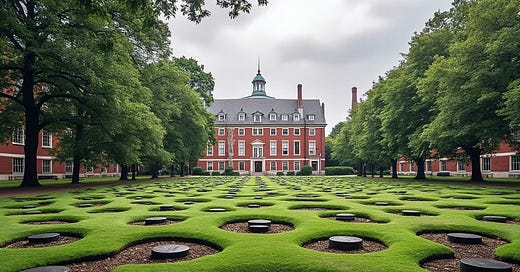Harvard Yard Has Become A Free Speech Minefield
Profs at the storied school tread with trepidation into potentially sensitive subjects
It's hard for free speech to flourish in a climate of fear, enforced conformity, “groupthink” and strictly policed political correctness. It's hard to speak and think freely, as a professor or a student, when any errant, unpopular, or unauthorized thought or phrase could get you canceled -- when your campus becomes a minefield through which you must tiptoe with care.
If you doubt it, just ask an instructor at Harvard.
The pins and needles on which Harvard instructors walk highlight how bad things have become at our supposed bastions of free-thinking, open inquiry, and fearless truth-seeking. And the problem has only grown worse in the wake of the war in Gaza, according to a must-read story in The New York Post.
Reports the Post:
Harvard is the nation’s premier university and produces a disproportionate number of our leaders. It’s expected to set an example and be a bastion of discourse and debate — with its professors boldly leading the way.
But a survey published by the university’s own Open Inquiry and Constructive Dialogue Working Group found a solid majority of profs now avoid touchy topics both inside and outside of the classroom, after things boiled over in the last year with campus protests related to the war in Gaza.
The 1,411 surveyed faculty and staff were prompted to “think about teaching a controversial issue in a class at Harvard” — and their primary reaction seems to be fear.
Just 18% said they would be very comfortable doing so, and 31% somewhat comfortable. But more than half said they would be somewhat (33%) or very (18%) reluctant.
That means more than half of Harvard’s faculty admitted they’re afraid to discuss controversial issues in the classroom.
The report on which this reporting is based can be found here. It’s also well worth studying.
But it’s not just the conflict in Gaza that has people whispering, self-censoring, or ducking for cover on campus. A survey found “that the issues Harvard students are most worried about discussing are… precisely the most pressing issues in our culture and politics today,” according to the story. “67% were scared to discuss Israel, 42% affirmative action, 36% free speech, 36% police misconduct, 34% racial inequality, 31% religion, and 30% abortion.”
Greg Lukianoff, president and CEO of the Foundation for Individual Rights and Expression (FIRE), doesn’t entirely blame professors for being apprehensive, given the climate of enforced political and intellectual conformity that’s been created at Harvard. “Professors face a never-ending conformity gauntlet, from hiring to tenure decisions… to the possibility of being canceled, to students themselves who are hostile to wrong-think,” he told The Post.
Harvard’s hometown paper, The Boston Globe, ran a response to the report calling on faculty to lead a free speech revival at the school. But that suggestion drew skepticism from some quarters. Steve McGuire, The Paul & Karen Levy Fellow in Campus Freedom at the American Council of Trustees and Alumni, bluntly shot down the idea on X. The problem with expecting faculty to revive free speech, according to McGuire, isn’t just that so many of them are hunkered down in bunkers. It’s that an alarming number of them just aren’t for free speech.
Ouch! That’s gotta hurt.
Not everyone agrees that the free speech culture at Harvard has gone to hell in a handbasket.
Harvard Law School Professor Randall L. Kennedy lauded the school’s free speech culture, while condemning its recent embrace of institutional neutrality, during a recent debate with George Washington University Law Professor Jonathan Turley, which was covered by The Harvard Crimson here.
Reported The Crimson:
Turley accused Harvard of limiting conservative perspectives, citing a Crimson survey which found that less than 3 percent of faculty in the Faculty of Arts and Sciences identified as conservative.
“You virtually cleansed your faculty of Republicans and conservatives,” Turley said. “That doesn’t just happen, right? It doesn’t just happen that you have this effective ideological echo chamber at Harvard.”
But Kennedy argued that the political viewpoints of faculty are not a good measure of whether Harvard is achieving its central objectives.
“This is a institution that has a educational mission. It’s not a legislature, it’s not a jury, and the values that should matter are intellectual/scholarly values,” Kennedy said.
This Steamboat Institute-sponsored debate can be watched here.
One revealing moment came when Kennedy, who teaches the Constitution to our future lawyers, defended the cancellation of invited speakers as a perfectly legitimate use of free speech.
There’s no question about it: things look bleak for free speech at Harvard. But you can help get things turned around by joining and supporting Harvard Alumni for Free Speech.




